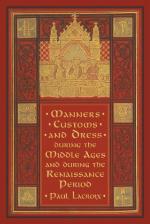This system of rents and dues of all kinds was so much the basis of social organization in the Middle Ages, that it sometimes happened that the lower orders benefited by it.
Thus the bed of the Bishop of Paris belonged, after his death, to the poor invalids of the Hotel Dieu. The canons were also bound to leave theirs to that hospital, as an atonement for the sins which they had committed. The Bishops of Paris were required to give two very sumptuous repasts to their chapters at the feasts of St. Eloi and St. Paul. The holy men of St. Martin were obliged, annually, on the 10th of November, to offer to the first President of the Court of Parliament, two square caps, and to the first usher, a writing-desk and a pair of gloves. The executioner too received, from various monastic communities of the capital, bread, bottles of wine, and pigs’ heads; and even criminals who were taken to Montfaucon to be hung had the right to claim bread and wine from the nuns of St. Catherine and the Filles Dieux, as they passed those establishments on their way to the gibbet.
[Illustration: Fig. 32.—Front of the Ancient Church of the Abbey of Sainte-Genevieve, in Paris, founded by Clovis, and rebuilt from the Eleventh to Thirteenth Centuries.—State of the Building before its Destruction at the End of the Last Century.]
Fines were levied everywhere, at all times, and for all sorts of reasons. Under the name of epices, the magistrates, judges, reporters, and counsel, who had at first only received sweetmeats and preserves as voluntary offerings, eventually exacted substantial tribute in current coin. Scholars who wished to take rank in the University sent some small pies, costing ten sols, to each examiner. Students in philosophy or theology gave two suppers to the president, eight to the other masters, besides presenting them with sweetmeats, &c. It would be an endless task to relate all the fines due by apprentices and companions before they could reach mastership in their various crafts, nor have we yet mentioned certain fines, which, from their strange or ridiculous nature, prove to what a pitch of folly men may be led under the influence of tyranny, vanity, or caprice.
Thus, we read of vassals descending to the humiliating occupation of beating the water of the moat of the castle, in order to stop the noise of the frogs, during the illness of the mistress; we elsewhere find that at times the lord required of them to hop on one leg, to kiss the latch of the castle-gate, or to go through some drunken play in his presence, or sing a somewhat broad song before the lady.
At Tulle, all the rustics who had married during the year were bound to appear on the Puy or Mont St. Clair. At twelve o’clock precisely, three children came out of the hospital, one beating a drum violently, the other two carrying a pot full of dirt; a herald called the names of the bride-grooms, and those who were absent or were unable to assist in breaking the pot by throwing stones at it, paid a fine.




